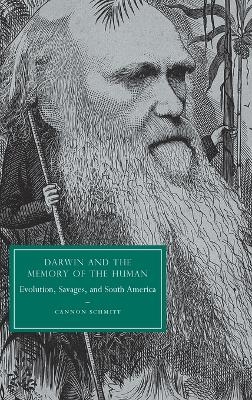
Darwin and the Memory of the Human
Evolution, Savages, and South America
Seiten
2009
Cambridge University Press (Verlag)
978-0-521-76560-2 (ISBN)
Cambridge University Press (Verlag)
978-0-521-76560-2 (ISBN)
In this book Cannon Schmitt shows how Darwin and other Victorian naturalists transformed their encounters with the South American continent and its indigenous peoples into influential accounts of biological change, race, and the origins of humanity. His observations open a new discussion concerning the cultural meanings of evolutionary theory in the Victorian period.
When the young Charles Darwin landed on the shores of Tierra del Fuego in 1832, he was overwhelmed: nothing had prepared him for the sight of what he called 'an untamed savage'. The shock he felt, repeatedly recalled in later years, definitively shaped his theory of evolution. In this original and wide-ranging study, In this book Cannon Schmitt shows how Darwin and other Victorian naturalists transformed such encounters with South America and its indigenous peoples into influential accounts of biological and historical change. Redefining what it means to be human, they argue that the modern self must be understood in relation to a variety of pasts - personal, historical, and ancestral - conceived of as savage. Schmitt reshapes our understanding of Victorian imperialism, revisits the implications of Darwinian theory, and demonstrates the pertinence of nineteenth-century biological thought to current theorizations of memory.
When the young Charles Darwin landed on the shores of Tierra del Fuego in 1832, he was overwhelmed: nothing had prepared him for the sight of what he called 'an untamed savage'. The shock he felt, repeatedly recalled in later years, definitively shaped his theory of evolution. In this original and wide-ranging study, In this book Cannon Schmitt shows how Darwin and other Victorian naturalists transformed such encounters with South America and its indigenous peoples into influential accounts of biological and historical change. Redefining what it means to be human, they argue that the modern self must be understood in relation to a variety of pasts - personal, historical, and ancestral - conceived of as savage. Schmitt reshapes our understanding of Victorian imperialism, revisits the implications of Darwinian theory, and demonstrates the pertinence of nineteenth-century biological thought to current theorizations of memory.
Cannon Schmitt is Associate Professor of English at the University of Toronto.
Introduction; 1. Charles Darwin's savage mnemonics; 2. Alfred Russel Wallace's tropical memorabilia; 3. Charles Kingsley's recollected empire; 4. W. H. Hudson's memory of loss; Coda: some reflections.
| Erscheint lt. Verlag | 29.5.2009 |
|---|---|
| Reihe/Serie | Cambridge Studies in Nineteenth-Century Literature and Culture |
| Verlagsort | Cambridge |
| Sprache | englisch |
| Maße | 160 x 236 mm |
| Gewicht | 550 g |
| Themenwelt | Geisteswissenschaften ► Sprach- / Literaturwissenschaft ► Anglistik / Amerikanistik |
| Geisteswissenschaften ► Sprach- / Literaturwissenschaft ► Literaturgeschichte | |
| Naturwissenschaften ► Biologie ► Evolution | |
| ISBN-10 | 0-521-76560-9 / 0521765609 |
| ISBN-13 | 978-0-521-76560-2 / 9780521765602 |
| Zustand | Neuware |
| Haben Sie eine Frage zum Produkt? |
Mehr entdecken
aus dem Bereich
aus dem Bereich
Poetik eines sozialen Urteils
Buch | Hardcover (2023)
De Gruyter (Verlag)
59,95 €
Entzauberung und Faszination des Immergleichen in Literatur und Film
Buch | Softcover (2024)
Springer Fachmedien Wiesbaden GmbH (Verlag)
84,99 €
Buch | Softcover (2024)
belleville (Verlag)
20,00 €


